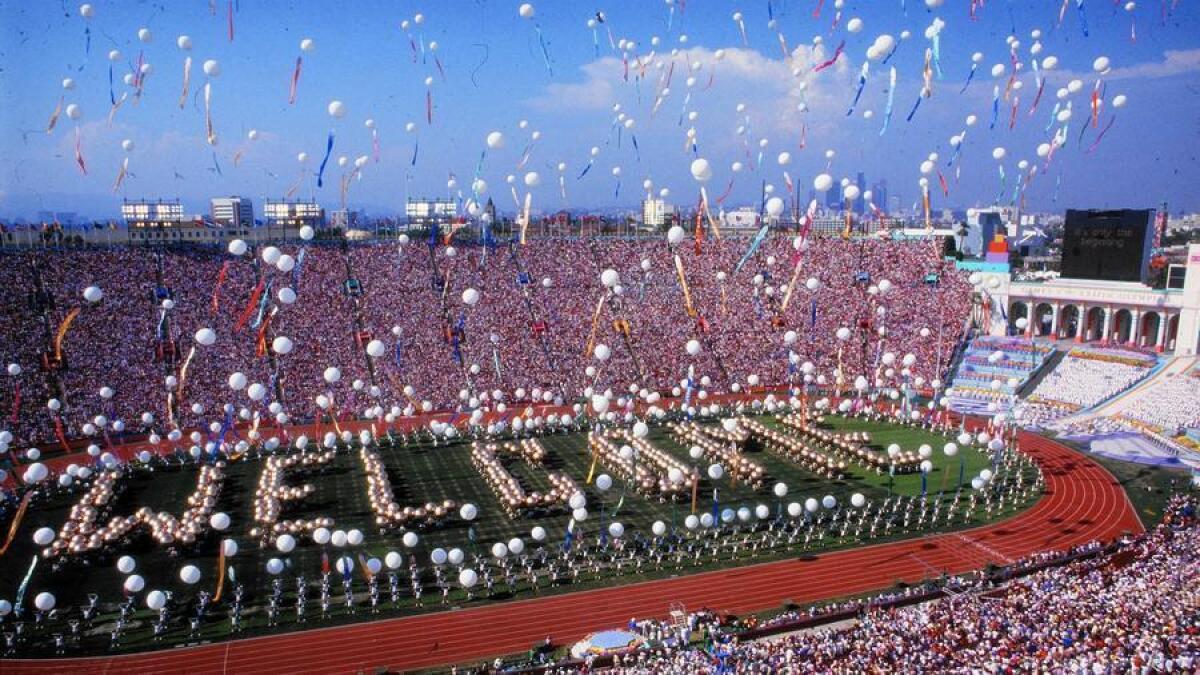L.A. City Council to vote soon on authorizing 2024 Olympic bid

The 1984 Summer Games in Los Angeles, pictured, generated a profit. The city’s projected budget for the 2024 Olympics is $4.1 billion.
The Los Angeles City Council expects to vote next week on whether L.A. should continue its quest to host the 2024 Summer Games, setting the stage for a public airing of questions surrounding an Olympic bid that has been largely opaque for the taxpayers who could be asked to underwrite the projected $4.1-billion event.
Council President Herb Wesson submitted a motion Friday asking lawmakers to grant Mayor Eric Garcetti authority to sign a legally binding agreement with the U.S. Olympic Committee that would enable L.A. to compete with cities across the world for the Games.
Wesson said in an interview that unless the city attorney objects, he expects the mayor’s office to disclose a number of documents connected to the bid that have so far been kept secret, such as detailed financial calculations for the $150-million surplus Garcetti asserts the Olympics would generate.
“I don’t see how you can keep them not” public, Wesson said of the details of the city’s Olympic bid. “This is very important, and this could be an opportunity to build community trust.”
In response to Wesson’s remarks, mayoral aide Jeff Millman said Friday night that the city’s Olympic bid proposal, budget and further documentation of pending legal agreements with the USOC would be shared with council members before the vote.
Despite the prestige, publicity and tourism dollars that come with the Olympic Games, concerns about the event’s financial implications have been at the forefront of discussions in American cities contemplating hosting the event.
Boston, the USOC’s first-choice bidder for the 2024 Games, backed out after Mayor Marty Walsh said he was unwilling to agree to the International Olympic Committee’s demand that a host city guarantee it will pay for any financial overruns. L.A. refused to provide such a guarantee when it last hosted the Summer Games, in 1984.
Garcetti, unlike Walsh, says he would pledge to provide such a financial backstop. However, he insists the city would almost certainly not be called on to cover budget overruns, in part because L.A. can save money by using its existing sporting venues instead of building new ones.
“On the one-to-five hot scale — one being the coldest — my personal assessment, for what it’s worth, is about a one” regarding the Olympics’ risk for taxpayers, Garcetti said during an interview with The Times’ editorial board this month.
Garcetti and sports executive Casey Wasserman, his private-sector partner in the Olympic bid, have so far refused to release the materials they presented to the USOC in December, when L.A. was initially passed over in favor of Boston. Garcetti has said that some details of the city’s hosting proposal, such as the locations of athlete housing, should be kept under wraps to forestall real-estate speculation.
If it answers some questions, the resolution the council is expected to vote on gives rise to others.
Submitted with Wesson’s motion was the agreement the city would sign with the USOC to proceed with the bidding process. The document is called a “joinder,” a legal term that typically indicates a promise to join an existing contract and abide by its terms.
But in this case, the related contract — a longer and more detailed agreement between the Games’ local organizing committee and the USOC — has not been reviewed by the council or been made public by the mayor’s office. Zev Yaroslavsky, a former county supervisor who was on the City Council during the 1984 Games, said that secrecy put the council in an uncomfortable position.
“The City Council should have before it all documents to which they are agreeing, either directly or by reference. As of today, that doesn’t appear to be the case,” said Yaroslavsky, who opposes the idea of L.A. guaranteeing to cover Olympic cost overruns. “I don’t understand why anyone would vote for an agreement they haven’t seen.”
The joinder also underlines ongoing confusion about how much influence the city’s legislative body will have over the bid’s progress.
The agreement appears to limit further input from elected officials on whether the city enters into a contract with the IOC two years from now. It states that after the joinder is signed no “legislative, rule-making or administrative action, referendum or other electoral action” is required for the city to enter into a contract with the IOC.
However, a companion document to the agreement — not included in the paperwork provided to the council but shared with The Times by Millman on Friday — states that the final IOC contract “will require formal adoption by the Los Angeles City Council.” Wesson’s resolution in support of the joinder also states that the council, as well as the mayor, “must review and approve” the ultimate contract.
Wesson said in an interview Friday that he did not see the joinder as a blank check for the mayor’s office to pursue the Games, but as the beginning of the council’s involvement in what has so far been a largely behind-the-scenes effort. “We want to make sure that this is thoroughly vetted,” he said. “I think going forward we have the opportunity to put together a pretty tight deal.”
Wesson declined to say whether he agreed with the mayor’s willingness to provide a guarantee for cost overruns, saying he would have to further study the issue. However, he said that L.A. was in a “much stronger position” to negotiate favorable terms with both the U.S. and International Olympic committees after Boston’s withdrawal.
“I see the opportunity for additional protections” for the city, he said.
More to Read
Sign up for Essential California
The most important California stories and recommendations in your inbox every morning.
You may occasionally receive promotional content from the Los Angeles Times.











